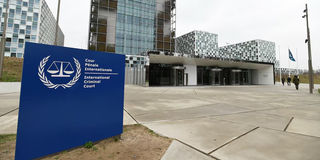Trump administration imposes sanctions on four ICC judges in unprecedented move

The International Criminal Court building is seen in The Hague, Netherlands. PHOTO | REUTERS
What you need to know:
- The ICC slammed the move, saying it was an attempt to undermine the independence of an international judicial institution
Washington. President Donald Trump's administration on Thursday imposed sanctions on four judges at the International Criminal Court, an unprecedented retaliation over the war tribunal's issuance of an arrest warrant for Israeli Prime Minister Benjamin Netanyahu and a past decision to open a case into alleged war crimes by U.S. troops in Afghanistan.
Washington designated Solomy Balungi Bossa of Uganda, Luz del Carmen Ibanez Carranza of Peru, Reine Adelaide Sophie Alapini Gansou of Benin and Beti Hohler of Slovenia, according to a statement from U.S. Secretary of State Marco Rubio.
"As ICC judges, these four individuals have actively engaged in the ICC’s illegitimate and baseless actions targeting America or our close ally, Israel. The ICC is politicized and falsely claims unfettered discretion to investigate, charge, and prosecute nationals of the United States and our allies," Rubio said.
The ICC slammed the move, saying it was an attempt to undermine the independence of an international judicial institution that provides hope and justice to millions of victims of "unimaginable atrocities."
Both judges Bossa and Ibanez Carranza have been on the ICC bench since 2018. In 2020 they were involved in an appeals chamber decision that allowed the ICC prosecutor to open a formal investigation into alleged war crimes by American troops in Afghanistan.
Since 2021, the court had deprioritized the investigation into American troops in Afghanistan and focused on alleged crimes committed by the Afghan government and the Taliban forces.
ICC judges also issued arrest warrants for Netanyahu, former Israeli defense chief Yoav Gallant and Hamas leader Ibrahim Al-Masri last November for alleged war crimes and crimes against humanity during the Gaza conflict. Alapini Gansou and Hohler ruled to authorize the arrest warrant against Netanyahu and Gallant, Rubio said.
The move deepens the administration's animosity toward the court. During the first Trump administration in 2020, Washington imposed sanctions on then-prosecutor Fatou Bensouda and one of her top aides over the court's work on Afghanistan.
The measures also follow a January vote at the U.S. House of Representatives to punish the ICC in protest over its Netanyahu arrest warrant. The move underscored strong support among Trump's fellow Republicans for Israel's government.
That’s the rocket firm owned by Musk, which has become a key player in space launches.
Difficult time for ICC
The measures triggered uproar among human-rights advocates. Liz Evenson, international justice director at Human Rights Watch, said the punitive measures were a "flagrant attack on the rule of law at the same time as President Trump is working to undercut it at home."
Sanctions severely hamper individuals' abilities to carry out even routine financial transactions as any banks with ties to the United States, or that conduct transactions in dollars, are expected to have to comply with the restrictions.
But the Treasury Department also issued general licenses, including one allowing the wind-down of any existing transactions involving those targeted on Thursday until July 8, as long as any payment to them is made to a blocked, interest-bearing account located in the U.S.
The new sanctions come at a difficult time for the ICC, which is already reeling from earlier U.S. sanctions against its chief prosecutor, Karim Khan, who last month stepped aside temporarily amid a United Nations investigation into his alleged sexual misconduct.
The ICC, which was established in 2002, has international jurisdiction to prosecute genocide, crimes against humanity and war crimes in member states or if a situation is referred by the U.N. Security Council. The United States, China, Russia and Israel are not members.
It has high-profile war crimes investigations under way into the Israel-Hamas conflict and Russia's war in Ukraine as well as in Sudan, Myanmar, the Philippines, Venezuela and Afghanistan.
The ICC has issued arrest warrants for President Vladimir Putin on suspicion of deporting children from Ukraine, and for Netanyahu for alleged war crimes in Gaza. Neither country is a member of the court and both deny the accusations and reject ICC jurisdiction.





